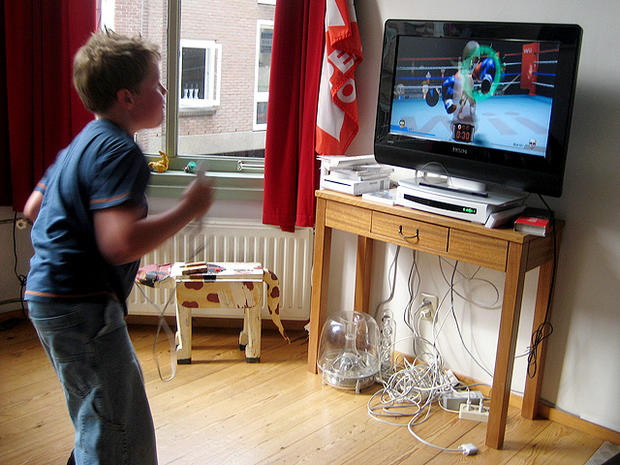Active video games can increase energy expenditure in children
(CBS News) Video games might be good for your health after all.
A new study shows that active video games -- such as "Dance Central" and "Kinect Sports: Boxing" - can increase oxygen intake, heart rate and energy expenditure in children, leading researchers to believe that the games may be a way to combat childhood obesity.
Pediatricians warn against trampoline use at home, citing injury risks
Pictures: America's laziest teens: Which state is worst?
"Although it is unlikely that active video game play can single-handedly provide the recommended amount of physical activity for children or expend the number of calories required to prevent or reverse the obesity epidemic, it appears from the results of this study that Kinect active game play can contribute to children's physical activity levels and energy expenditure, at least in the short term," the authors wrote.
According to the Centers for Disease Control and Prevention, childhood obesity has tripled in the last 30 years to nearly 20 percent of U.S. children and adolescents. In 1980, about 7 percent of children aged 6 to 11 were obese. Similar increases were seen in adolescents between the ages of 12 and 19, whose obesity numbers increased from 5 percent to 18 percent over the same time period. As of 2008, more than one-third of U.S. children and adolescents were overweight or obese.
For the study, which was published online on September 2012 in the Archives of Pediatrics & Adolescent Medicine, researchers measured the heart rate, VO2 (oxygen uptake) and energy expenditure for 18 children - 10 boys and 8 girls - during rest, sedentary game play or controller-based video games and active game play, which used a webcam-style sensor and device instead of a controller to detect the player's movements. The children were between the ages of 11 and 15.
Energy expenditure increased by 150 percent when kids played "Dance Central" and 263 percent when they played "Kinetic Sports Boxing" above their resting values. In comparison, energy expenditure for these two games were 103 percent and 194 percent higher than traditional video gaming levels respectively.
While the researchers may think active video games qualify as exercise given their findings, whether or not it will curb obesity rates remains to be seen. Astudy in February found kids given active video games were no more fit than kids who were given normal games.
It is recommended by the Centers for Disease Control and Prevention that children get 60 minutes or more of aerobic exercise each day, with intense activities like running at least three times a week. Muscle-strengthening activities and bone strengthening activities are also recommended three times a week.

